Apex and Oakland: Partnership for Black History education, part 1
21 May 2019 – Deborah Strahorn, Marcy Breffle and Adina Langer
methods, TPH 40.3, public engagement, community history, African American history, memory, Black museums series, collaboration, museums, education, The Public Historian
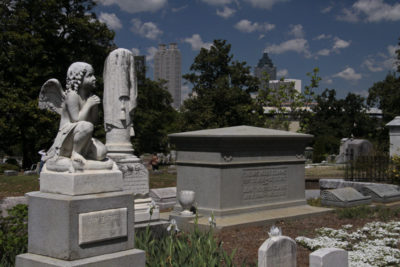
Oakland Cemetery is a public park in Atlanta, Georgia. Photo credit: Historic Oakland Foundation
Editors’ Note: This post is part of a History@Work series that complements The Public Historian volume 40, number 3, which is about the history of the field of Black Museums. The piece, written by educators at Atlanta’s APEX Museum: African American Panoramic Experience and Historic Oakland Cemetery, considers the collaboration between these two institutions around the interpretation of African American history within the context of the emergence of the field of Black Museums described in Jeff Hayward and Christine Larouche’s article “The Emergence of the Field of African American Museums” and African American history more generally. This piece takes the format of an interview with questions posed by History@Work lead editor Adina Langer (AL) and answers given by Deborah Strahorn (DS) of APEX Museum and Marcy Breffle (MB) of Historic Oakland Cemetery.
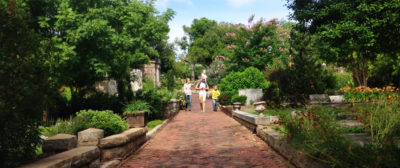
Family walking in Oakland Cemetery. Photo credit: Historic Oakland Foundation
AL: Please describe the mission of your institution, a little about its history, and your role there.
MB: Historic Oakland Foundation (HOF) is a non-profit organization that manages Oakland Cemetery, a historic cemetery founded in 1850. It’s one of the oldest cultural landmarks in Atlanta. Since 1976 HOF has partnered with the City of Atlanta to preserve, restore, enhance, and share Oakland Cemetery with the public.
I have managed Oakland Cemetery’s education department since spring 2015. I work with a fantastic group of volunteers and staff members to develop and execute a wide range of programming, including guided walking tours, K-12 field trip experiences, family programs, and educational workshops.
DS: The APEX was established in 1978 to accurately interpret and present history from an African American perspective in order to help all American and international visitors better understand and appreciate the contributions of African Americans to America and the world. It was founded by Dan Moore, Sr., a filmmaker from Philadelphia. (Editor’s note: You can listen to an interview with Moore about operating the Museum here.) He met Dr. Benjamin E. Mays at a banquet in Mays’ honor and was so impressed with Mays’ contributions to African American higher education that he felt Atlanta should have an African American Museum.
My role at the APEX is special projects coordinator and storyteller-in-residence. My responsibilities include audience development to bring new audiences to the museum and to form partnerships to grow our audience. One of my charges is to seek new partnerships and create new programs to make that happen.
AL: Who do you see as your institution’s primary audience? How would you like to see this audience grow or change?
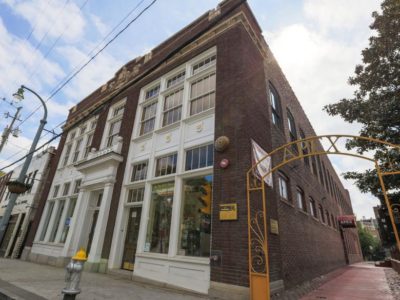
APEX Museum entrance, 2019. Photo credit: Explore Georgia
DS: Because of our proximity to the college campuses, our target audience is college students. We are looking to create lifelong museum goers so we are reaching out to a younger base; at the same time, we are still serving our older visitors by transforming them from visitors to members to patrons. The audience does vary depending on the program, event, or exhibition we are displaying. And we attract a lot of out-of-town tourists as well.
MB: Atlanta’s official historian, Franklin Garrett, used to say that Oakland is “Atlanta’s most tangible link between the past and the present.” We operate under the belief that to understand the present and plan for the future we must know our history—what is past is prologue. With that in mind, our audience is the community of Atlanta.
Our current visitors skew white, older, and middle class. We would like to see our visitor demographics reflect the population of Atlanta. We want to share Oakland Cemetery with younger audiences, people of color, members of the LGBTQ+ community, and visitors of all ages and backgrounds. To do this, we are expanding our interpretation, seeking diversity when recruiting volunteers and board members, leveraging partnerships with community and civic organizations, and improving our relationships with local neighborhoods.
AL: When did Historic Oakland Foundation and APEX first start working together, and in what capacity?
MB: Deb and I first began working together in December 2016 to promote Black History Month programs at Oakland and the APEX Museum.
DS: After partnering in 2016, we partnered again when Oakland held a meeting at the museum to talk about raising funds for the renovation of the African American grounds.
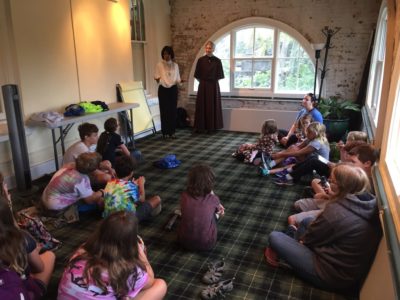
Deborah Strahorn performing as a storyteller at Oakland Cemetery. Photo credit: Marcy Breffle
MB: Although we’ve continued to champion each other’s work over the years, our partnership has moved beyond digital and print media cross-promotion. We strive to create opportunities for one another to reach new audiences by providing physical platforms in our respective institutions. Deb Strahorn is a longtime HOF supporter. A gifted storyteller, Deb shares her talents as an actor for HOF’s signature event, Capturing the Spirit of Oakland Halloween tours. Every October, thousands of visitors attend these after-hours tours of the cemetery and discover the stories of six to eight residents (our name for the people buried at Oakland) through short museum theatre performances. Deb and I met during this event and realized that we shared a common goal—to educate through storytelling.
AL: Can you tell us more about how you have used your shared interest in storytelling to educate but also reach fundraising and preservation goals?
MB: In 2017, APEX generously hosted a community town hall for HOF to announce the launch of a three-phase project to restore Oakland’s historic African American burial grounds. APEX provided the space and promoted the meeting to its network. HOF staff met with stakeholders, including descendants of Oakland residents, to outline restoration plans and garner community support.
Over the past few years, HOF has provided a tent space for APEX staff to interact with visitors at “Sunday in the Park,” Oakland’s annual Victorian fall festival. During the 2018 festival, Deb performed several monologues as Oakland resident Selena Sloan Butler, the founder of the National Congress of Colored Parents and Teachers in the 1920s. Deb shared the story of Selena Sloan Butler (1872-1964), provided updates on the African American Grounds restoration project, and encouraged visitors to support HOF. Dozens of visitors watched each performance, visited the APEX tent to learn about the museum, and made donations to fund HOF restoration efforts.
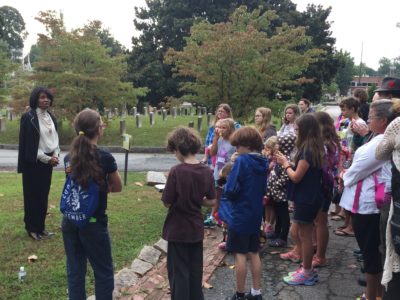
Deb Strahorn performing at the Young Historians event in Oakland Cemetery in 2017. Photo credit: Marcy Breffle
Deb is also a familiar face at Young Historians, our monthly homeschool program at Oakland. She teaches storytelling to our Young Historian homeschoolers and is an enthusiastic audience member during student performances.
~Deborah Strahorn is Storyteller-in-Residence at the APEX Museum in Atlanta, Georgia
~Marcy Breffle is education manager at Oakland Cemetery in Atlanta, Georgia
~Adina Langer is curator at the Museum of History and Holocaust Education at Kennesaw State University in Kennesaw, Georgia



